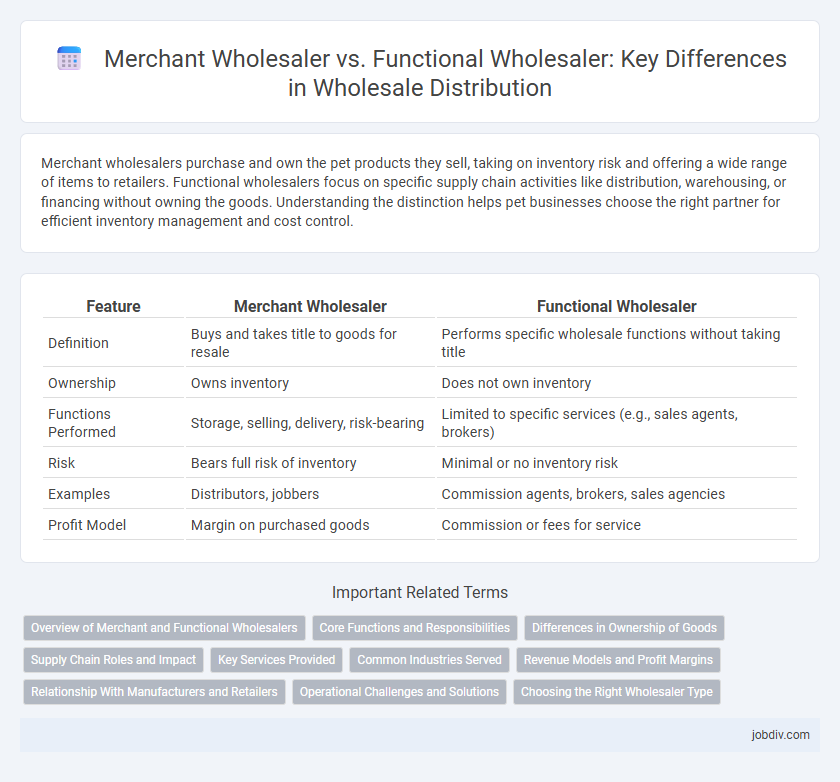Merchant wholesalers purchase and own the pet products they sell, taking on inventory risk and offering a wide range of items to retailers. Functional wholesalers focus on specific supply chain activities like distribution, warehousing, or financing without owning the goods. Understanding the distinction helps pet businesses choose the right partner for efficient inventory management and cost control.
Table of Comparison
| Feature | Merchant Wholesaler | Functional Wholesaler |
|---|---|---|
| Definition | Buys and takes title to goods for resale | Performs specific wholesale functions without taking title |
| Ownership | Owns inventory | Does not own inventory |
| Functions Performed | Storage, selling, delivery, risk-bearing | Limited to specific services (e.g., sales agents, brokers) |
| Risk | Bears full risk of inventory | Minimal or no inventory risk |
| Examples | Distributors, jobbers | Commission agents, brokers, sales agencies |
| Profit Model | Margin on purchased goods | Commission or fees for service |
Overview of Merchant and Functional Wholesalers
Merchant wholesalers independently own the goods they sell, assuming full responsibility for inventory management, pricing, and sales operations, which allows them to provide a wide range of products directly to retailers and other businesses. Functional wholesalers specialize in specific activities within the distribution process, such as breaking bulk, warehousing, or transportation, without necessarily owning the products, enabling efficient service tailored to manufacturers' or retailers' needs. Understanding the distinction between merchant and functional wholesalers is essential for optimizing supply chain logistics and improving wholesale trade efficiency.
Core Functions and Responsibilities
Merchant wholesalers buy, store, and sell goods directly to retailers or industrial users, taking full ownership and bearing inventory risk. Functional wholesalers perform specific functions such as bulk breaking, sorting, or delivering, often without taking title to the goods. Core responsibilities for merchant wholesalers include inventory management and sales, while functional wholesalers focus on specialized logistical services and facilitating efficient supply chain operations.
Differences in Ownership of Goods
Merchant wholesalers take full ownership of the goods they sell, purchasing inventory outright and assuming all risks related to storage and distribution. Functional wholesalers, on the other hand, provide specific services such as warehousing or transportation but do not hold ownership of the goods at any point. This fundamental difference in ownership affects liability, pricing strategies, and operational responsibilities within the wholesale supply chain.
Supply Chain Roles and Impact
Merchant wholesalers own the products they sell, taking on inventory risk while providing essential warehousing and distribution services that streamline supply chain efficiency. Functional wholesalers specialize in specific supply chain roles such as financing, transportation, or grading, offering targeted expertise that enhances operational flow without owning the goods. Understanding these distinctions helps businesses optimize inventory management, reduce costs, and improve delivery speed in complex supply networks.
Key Services Provided
Merchant wholesalers primarily buy, store, and sell goods in bulk, offering inventory management, risk-bearing, and financing services to retailers and other businesses. Functional wholesalers, on the other hand, specialize in specific services such as breaking bulk, sorting, grading, and providing logistical support without taking ownership of the products. Both types play crucial roles in optimizing the supply chain and ensuring efficient distribution and availability of goods in the wholesale market.
Common Industries Served
Merchant wholesalers primarily serve industries such as manufacturing, retail, and food services by purchasing goods in bulk and reselling them to retailers or other businesses. Functional wholesalers, including agents and brokers, often operate within specialized sectors like automotive, electronics, and apparel, facilitating transactions without taking title to the goods. Both types play critical roles in distribution channels by addressing unique needs of industries ranging from agriculture to pharmaceuticals.
Revenue Models and Profit Margins
Merchant wholesalers generate revenue primarily through the purchase and resale of goods, holding inventory to fulfill orders, which allows them to maintain higher profit margins due to control over pricing and stock management. Functional wholesalers, on the other hand, derive income by providing specialized services such as bulk breaking, delivery, or financing without necessarily owning inventory, resulting in narrower profit margins influenced by service fees and operational efficiency. Understanding these distinct revenue models is crucial for evaluating profitability and strategic positioning within the wholesale supply chain.
Relationship With Manufacturers and Retailers
Merchant wholesalers maintain direct purchasing power from manufacturers and hold inventory, facilitating a strong, autonomous relationship with retailers by providing a broad product assortment and credit services. Functional wholesalers, however, specialize in performing specific distribution functions such as selling, buying, or warehousing on behalf of manufacturers or retailers, often without taking title to goods. The distinction lies in merchant wholesalers acting as independent intermediaries, while functional wholesalers serve to streamline supply chains through contractual roles that enhance efficiency between producers and retailers.
Operational Challenges and Solutions
Merchant wholesalers face operational challenges such as inventory management, warehousing costs, and order fulfillment, requiring advanced logistics systems and automated inventory tracking to enhance efficiency. Functional wholesalers encounter difficulties in integrating value-added services like packaging and financing, which necessitate specialized training and technology upgrades to streamline operations. Both types benefit from adopting supply chain management software and data analytics to optimize workflows and reduce operational bottlenecks.
Choosing the Right Wholesaler Type
Choosing the right wholesaler type depends on the business's inventory management and service needs, with merchant wholesalers typically purchasing and storing goods to resell, providing full risk ownership and product availability. Functional wholesalers, on the other hand, specialize in performing specific wholesale functions such as sales, logistics, or financing without taking title to the goods, allowing businesses to reduce operational burdens. Understanding the distinct roles and benefits of merchant versus functional wholesalers enables businesses to optimize supply chain efficiency and cost-effectiveness.
Merchant Wholesaler vs Functional Wholesaler Infographic

 jobdiv.com
jobdiv.com